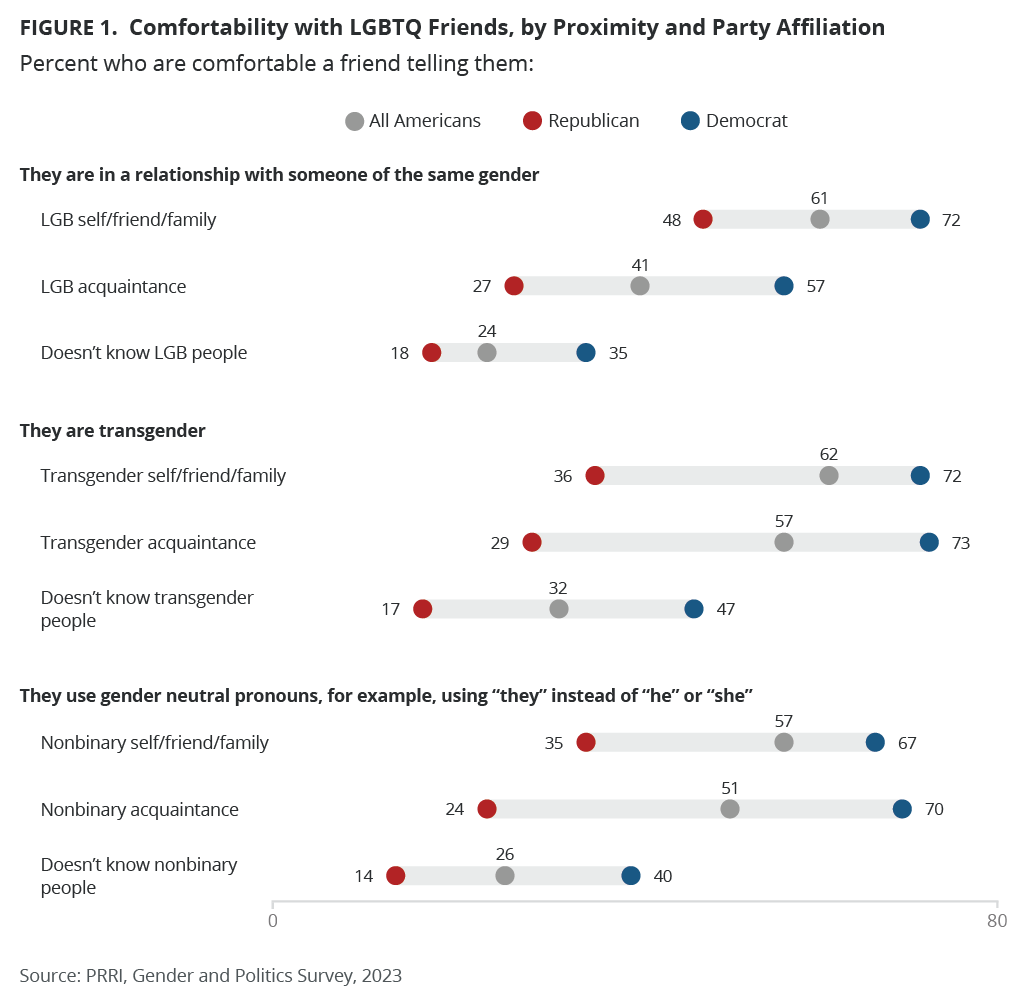In PRRI’s recent Gender and Politics survey, respondents were asked to rate how comfortable they would be if they found out that a friend was in a same-sex relationship, was transgender, or that they use gender-neutral pronouns or pronouns that may not match their perceived gender. Six in ten Americans (61%) who have a close personal relationship with someone who is Lesbian, Gay, or Bisexual (LGB) are generally comfortable learning that a friend is in a relationship with someone of the same gender, compared to 41% of Americans who know an LGB acquaintance and 24% of Americans who don’t know anyone who is LGB.[1]
Looking at how comfortable Americans are with learning that a friend is transgender, the gaps narrow. Those with a close personal relationship to someone who is transgender are only slightly more comfortable with learning that a friend is transgender (62%) than those who know an acquaintance who is transgender (57%), while around one-third of those who don’t know anybody who is transgender say they would be comfortable learning that a friend is transgender (32%).
Similarly, a majority of Americans (57%) who have a close personal relationship with someone who uses gender neutral pronouns (for example, using “they” rather than “he” or “she”) are comfortable with learning that a friend uses general neutral pronouns. Those with an acquaintance who is non-binary are twice as likely as those who don’t know anyone who is non-binary to be comfortable learning that a friend is non-binary (51% vs. 26%).
Republicans who know someone closely who is LGBTQ or are themselves LGBTQ overall are more likely to be comfortable with a friend telling them they are LGBTQ than Republicans who only know a LGBTQ acquaintance or don’t know anyone who is LGBTQ. They are notably less comfortable, however, if a friend were to tell them they are transgender (36%) or non-binary (35%) than if a friend told them they were lesbian, gay, or bisexual (48%). There are not a lot of differences among Republicans’ comfort levels with a friend telling them they are in a relationship with someone of the same gender who have an acquaintance who is LGB (27%), transgender (29%), or non-binary (24%), or Republicans who don’t know any LGB (18%), transgender (17%) or non-binary people (14%).

Interestingly, among Democrats’ comfort levels with a friend telling them they are in a relationship with someone of the same gender, the impact of knowing someone who is LGBTQ is wider when they know someone closely who is LGB (72%) compared with someone who is an LGB acquaintance (57%) or don’t know anyone who is LGB (35%). But the gap is smaller among Democrats’ comfort levels with a friend telling them they are transgender among Democrats who have a close relationship with someone who is transgender (72%) or have an acquaintance who is transgender (73%), compared with a Democrat who doesn’t know any transgender people (47%). The same pattern emerges in Democrats’ comfort levels with a friend telling them they use gender neutral pronouns among Democrats who have close relationships with non-binary people (67%) or Democrats who have non-binary acquaintances (70%) compared with Democrats who don’t know any non-binary people (40%).
This Spotlight Analysis is part of a series on Americans’ proximity to the LGBTQ community. Read more:
- Americans’ Perspectives on Gender and Proximity to the LGBTQ Community
- Americans’ Relationships to the LGBTQ Community, Partisanship, and Support for LGBTQ Rights
[1] “Close personal relationship” includes having a close friend or a family member who is LGBTQ or being LGBTQ themselves. “Acquaintances” refers to those who know members of the LGBTQ community.